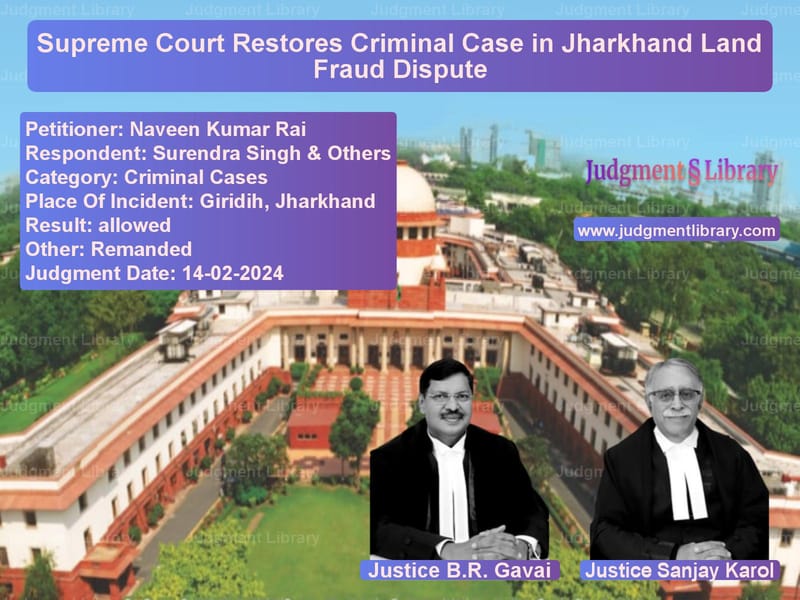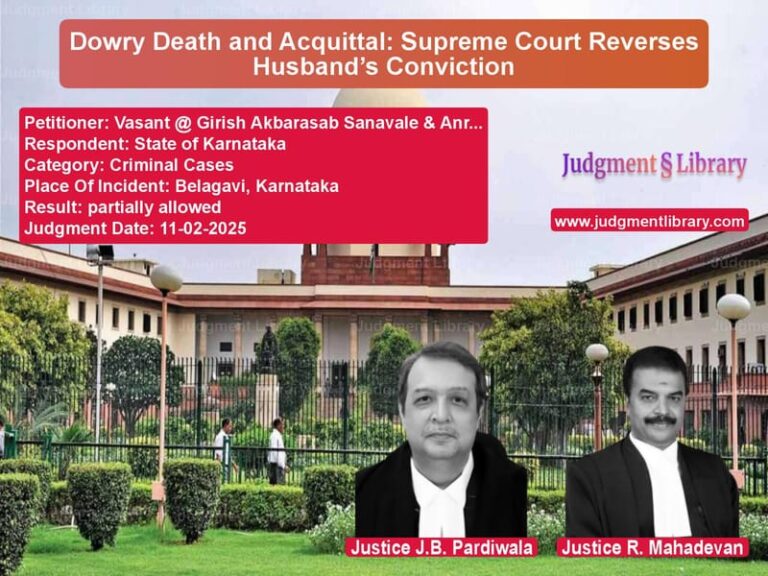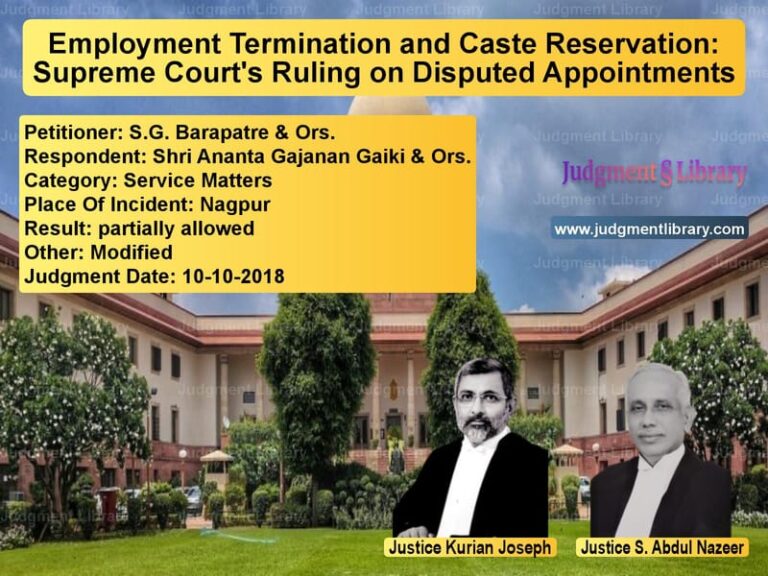Supreme Court Restores Criminal Case in Jharkhand Land Fraud Dispute
The Supreme Court of India has reinstated criminal proceedings against multiple accused in a Jharkhand land fraud case, overturning the quashing of the FIR by the Jharkhand High Court. The case involved allegations of forgery, cheating, and fraudulent land transactions under Sections 420, 467, 468, and 471 of the Indian Penal Code (IPC). This ruling reinforces the principle that civil disputes over land transactions do not automatically negate criminal liability if fraud is involved.
Background of the Case
The case arose when Naveen Kumar Rai, the original landowner, discovered that a Power of Attorney (PoA) had been forged to execute a fraudulent land sale in favor of Surendra Singh and others. The sale was registered at the Giridih sub-registrar’s office, prompting the owner to challenge its validity. Parallel to a civil suit, an official inquiry by the District Deputy Registrar confirmed forgery, leading to the cancellation of the fraudulent PoA and sale deed. Based on these findings, an FIR was registered under IPC sections related to fraud and forgery.
Arguments by the Appellant (Naveen Kumar Rai)
- The forgery of the PoA was confirmed by an official inquiry, justifying criminal prosecution.
- The involvement of multiple individuals in executing and witnessing the fraudulent transaction indicated an organized scheme.
- The High Court erred in treating the case as a purely civil dispute despite clear criminal elements.
- Quashing the FIR undermined the deterrence against property fraud.
Arguments by the Respondents (Accused Surendra Singh & Others)
- The matter was already under adjudication in a civil court, rendering criminal proceedings redundant.
- There was no direct evidence linking them to the forgery of the PoA.
- The accused were acting in good faith based on legal documentation at the time of the transaction.
- The prosecution was an abuse of the legal process, meant to harass the accused.
Supreme Court’s Observations and Judgment
1. Distinction Between Civil and Criminal Liability
The Court reiterated that criminal prosecution can proceed independently of civil suits when allegations involve fraud and forgery. It ruled:
“While a civil suit may determine ownership disputes, it does not preclude prosecution for fraud, which is an offense against the state.”
2. Authority of Sub-Registrar to Initiate Criminal Proceedings
The Supreme Court clarified that under Sections 82 and 83 of the Registration Act, 1908, a Sub-Registrar has the authority to initiate criminal proceedings in cases involving document fraud. The High Court’s ruling, which questioned the legitimacy of the FIR on procedural grounds, was incorrect.
3. Existence of Prima Facie Offense
The Court found that the facts established a prima facie case of forgery and fraud, warranting further investigation and trial. It stated:
“The exercise of power under Section 482 CrPC to quash the FIR was unjustified and entirely unsustainable.”
4. Directions for Expedited Trial
The Court ordered the reinstatement of the criminal case, directing the accused to appear before the trial court by March 1, 2024. It emphasized that the trial should proceed expeditiously to ensure swift justice.
Legal and Social Implications
1. Strengthening Legal Action Against Land Fraud
The ruling reinforces that fraudulent land transactions carry criminal liability and that perpetrators cannot escape consequences by framing disputes as civil in nature.
2. Clarifying the Role of Sub-Registrars
The judgment affirms that sub-registrars have a duty to initiate criminal action against document fraud and are not limited to canceling fraudulent registrations.
3. Preventing Misuse of Quashing Powers
The ruling restricts the misuse of Section 482 CrPC, ensuring that quashing FIRs does not become a loophole for evading criminal prosecution.
4. Ensuring Swift Trial Proceedings
By directing an expedited trial, the Court ensures that victims of fraud receive timely justice and that cases do not remain unresolved for years.
Conclusion
The Supreme Court’s decision in this case serves as a landmark precedent for prosecuting property fraud cases. By reinstating the criminal case and emphasizing the distinction between civil and criminal liability, the Court has strengthened protections against document forgery and land fraud. This ruling ensures that legal mechanisms remain robust in deterring fraudulent property transactions.
Petitioner Name: Naveen Kumar Rai.Respondent Name: Surendra Singh & Others.Judgment By: Justice B.R. Gavai, Justice Sanjay Karol.Place Of Incident: Giridih, Jharkhand.Judgment Date: 14-02-2024.
Don’t miss out on the full details! Download the complete judgment in PDF format below and gain valuable insights instantly!
Download Judgment: naveen-kumar-rai-vs-surendra-singh-&-oth-supreme-court-of-india-judgment-dated-14-02-2024.pdf
Directly Download Judgment: Directly download this Judgment
See all petitions in Fraud and Forgery
See all petitions in Property Disputes
See all petitions in Judgment by B R Gavai
See all petitions in Judgment by Sanjay Karol
See all petitions in allowed
See all petitions in Remanded
See all petitions in supreme court of India judgments February 2024
See all petitions in 2024 judgments
See all posts in Criminal Cases Category
See all allowed petitions in Criminal Cases Category
See all Dismissed petitions in Criminal Cases Category
See all partially allowed petitions in Criminal Cases Category







